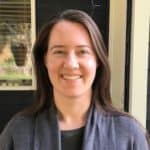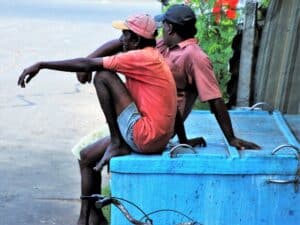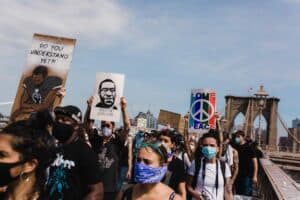 Editor’s Note: This post is part of a 4-part series for Advent 2022 by Liz Cooledge-Jenkins
Editor’s Note: This post is part of a 4-part series for Advent 2022 by Liz Cooledge-Jenkins
God,
Your love is unbounded.
Your love unbinds us.
When we know we are loved,
we are freer to try, to make mistakes,
to show our flaws, to be exactly who we are.
God, free us to accept that others might not accept us.
Free us to exist outside the confines society prepared for us.
Free us to help others do the same.
In your love we come to know our souls,
and to know that our souls are worth knowing.
Love heals our world, and that is no light task.
Love gathers together our hopes and joys and sorrows
in its embrace.
Your love is big enough for all that we are.
Gather us in communities that will love us into wholeness.
Open our hearts to make room for new people,
our minds to receive with grace those we don’t understand.
You are birthing into this world justice, connection, simplicity, truth.
You wrap your hopes and dreams in fragile skin.
You have loved us into being.
Infuse us with strong and honest love every day.
Amen.
It can be easy enough to say, God is love. Sometimes it is harder to know what that means. What does love look like, enfleshed in our world?
What love means to us can change over time. And what love looks like in our world is a question that’s worth asking over and over again—worth seeking urgently as our world falls apart in so many ways, as cracks that have festered for a long time are revealed more broadly.
I often find myself coming back to philosopher and activist Cornel West’s words: “Justice is what love looks like in public.” Or, on the flip side, as activist Michelle Higgins puts it, U.S. churchgoers often “claim to have steadfast love for people whose fight for justice means nothing to us.” This is not real love.
What, then, is real love—the kind of love that struggles for justice on behalf of and alongside the people it claims to love?
For bell hooks, love entails a “vision of relationships where everyone’s needs are respected, where everyone has rights, where no one need fear subordination or abuse.” Love is intrinsically connected with human rights, with equality, with mutual respect and care.
There is no domination in love, as hooks writes, and no coercion. When we love, we resist any urge we might feel toward these things.
We choose to build, instead, what eco-spiritual director Victoria Loorz calls “an equilibrium between [our] own interests and those of others.” For Loorz, “love is only present when we love self and at the same time we love the creative world, the neighbor.” There is a balance here. We seek to honor all beings, including ourselves.
It is easy to swing off-balance in either direction. Sometimes we care too much for our own wants and needs relative to others’ wants and needs. We are not attentive enough to those around us.
But we can also swing off-balance in the other direction. We can care too much for the wants and needs of others, not attending enough to our own. Neither of these paths is good.
As Rachel Held Evans wrote, “to love your neighbor as yourself, you obviously have to learn to love yourself.” What does this mean? “To love oneself well,” Held Evans observed, “is to regard one’s place in the world with candor and grace, grounded in a humble realization of one’s strengths as well as a clear-eyed understanding of one’s weaknesses … To love oneself well means not to diminish the beautiful creature that God made nor to cultivate an outsize image of that same person.”
We love by perceiving clearly. We love by regarding ourselves rightly. We do not love by ignoring our own needs but by being attentive to others’ needs and our own simultaneously.
Love is not a boundary-less, endless self-giving to the point of exhaustion, depletion, or self-erasure. This is especially important for people who—often by virtue of identities such as female gender, lower social class, racialization as people of color, or disability—have been expected throughout their lives to serve and serve, to give and not receive, to submit and subordinate their needs to the needs of others. This is not love.
I think often of this wisdom from embodiment practitioner Prentis Hemphill: “Boundaries are the distance at which I can love you and me simultaneously.” Boundaries allow us to love ourselves and others at the same time.
When we aim to love ourselves and others, we are not aiming for perfection. Love does not demand that. As Lutheran minister Nadia Bolz-Weber reminds us, “We always love imperfectly. It is the nature of human love. And it is okay.”
All of us love imperfectly. I know I do, very much so. It’s good to be reminded that this is the way of things. That love is still worth trying.
Really, love is a choice we make and continue to make. Presbyterian minister Mihee Kim-Kort encourages us to ask ourselves often: Who is my neighbor? For Kim-Kort, addressing this question involves “choosing joy and then choosing to love harder, love stubbornly, love persistently, love promiscuously, so that neighbor looks more like kinfolk and family.”
This is what we’re aiming for when we aim for love. And this is who God is—the God who is love.
What does God’s love look like? God loves us—to borrow Kim-Kort’s words—hard, stubbornly, persistently, promiscuously, joyfully. God loves us as kin, as family.
God loves us perfectly, with the perfection we as humans were never asked to achieve. God invites us to enter into a wide and wild love that includes ourselves, others, and this whole world we inhabit, including the earth and her systems. God invites us to seek justice—to struggle for an end to domination of all sorts.
This is a love that is tangible, tough, and courageous. This is the kind of love God embodied in the person of Jesus. And it is the kind of love God invites us into this Advent season. May this love come alive among us.
 Liz Cooledge Jenkins is a writer, preacher, chaplain, and former college campus minister who lives in Burien, WA. She has a BS in Symbolic Systems from Stanford University and an MDiv from Fuller Theological Seminary. She regularly posts justice-minded biblical reflections, poems, “super chill book reviews,” and more at lizcooledgejenkins.com; she can also be found on FB (Liz Cooledge Jenkins, Writer) and Instagram (@lizcoolj). Her sermon on Ruth and Boaz was included in Sojourners’ collection of immigration sermons, El Camino.
Liz Cooledge Jenkins is a writer, preacher, chaplain, and former college campus minister who lives in Burien, WA. She has a BS in Symbolic Systems from Stanford University and an MDiv from Fuller Theological Seminary. She regularly posts justice-minded biblical reflections, poems, “super chill book reviews,” and more at lizcooledgejenkins.com; she can also be found on FB (Liz Cooledge Jenkins, Writer) and Instagram (@lizcoolj). Her sermon on Ruth and Boaz was included in Sojourners’ collection of immigration sermons, El Camino.


